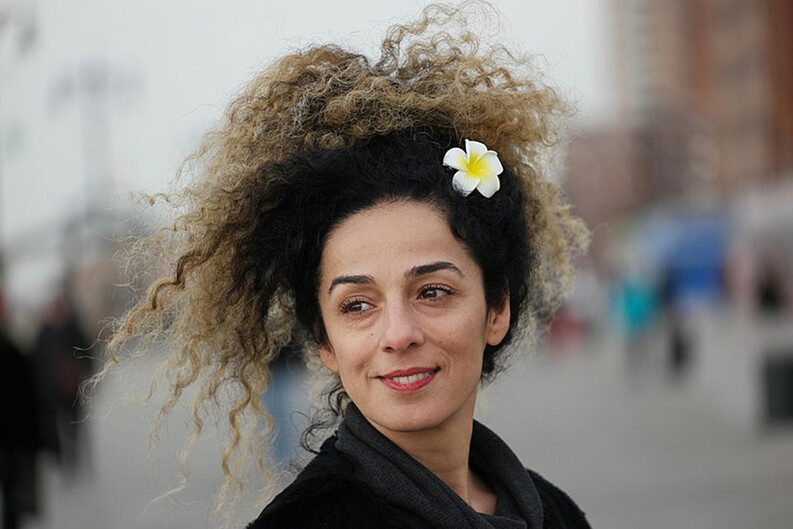Masih Alinejad and Roya Hakakian on Feminism and Freedom in Iran

On February 7, 2019, the Schell Center hosted Iranian feminist Masih Alinejad to speak about her activism for women’s rights in Iran. The event was moderated by Schell Center Executive Director Hope Metcalf and Iranian writer Roya Hakakian.
Metcalf introduced Alinejad as a “journalist, author, and troublemaker” whose fight against compulsory hijab laws, which Alinejad began in 2014, is now the largest civil disobedience campaign in the history of the Islamic Republic of Iran. However, as Alinejad recounted, it was difficult to make the transformation from the daughter of poor, conservative parents in a village of barely 200 families to one of Iran’s foremost women’s rights activists. When asked by Hakakian to describe her process of “shedding the veil,” Alinejad explained, “When you grow up in such a society, this small piece of cloth is going to be part of your body. It’s not easy to take it off.” But even without any formal knowledge of feminism or discrimination, she said, she was moved to action at an early age by the outrage she felt that her brother was permitted freedoms such as riding a bicycle and swimming in the river, but that these activities were off-limits to her. “I had to start my own revolution from my family’s kitchen,” she remembered.
Hakakian pointed out that Alinejad’s personal story makes her activism more compelling to women living under compulsory hijab laws, because her experience provides a blueprint for how they can achieve their own freedoms. Alinejad agreed, insisting, “I never said that I am the leader of a movement, but I always say that I was the first one in my own village who started a revolution.” Alinejad added that she encourages other women: “You can be the first one in your own community, in your own family, who can be an agent of change.”
In Alinejad’s efforts to defend women’s rights, she has encountered feminists and human rights activists who are reluctant to join or even oppose her campaign against compulsory hijab. Metcalf highlighted one of the prominent reasons for these attitudes when she asked about claims that the fight against Iran’s compulsory hijab law reinforces Islamophobia. Hakakian responded that choosing to defend people from Islamophobia and fighting for the rights of women in Muslim countries cannot be treated as mutually exclusive. “If you pick one victim at the expense of the other, you are doing nobody a favor and you are certainly not a human rights defender,” she contended.
Alinejad said that this concern about rising Islamophobia is the latest reason she has heard — over and over again — from people who tell her that it is not the right time to make her demands. Alinejad dismissed this argument, insisting, “When is the right time to talk about human rights, women’s rights, being abused in the Middle East? I definitely believe that this is the right time.”
Alinejad also vehemently opposed Westerners who cite respect for cultural differences as a reason for condoning the compulsory hijab law. “It is an insult to Iranian people when you call a discriminatory law part of our culture,” she said. To Alinejad, the “true representative of Iranian culture” is her mother, “because she wears the hijab but she doesn’t force you to wear the hijab.” Both Alinejad and Hakakian also rejected the idea that culture is fixed rather than dynamic, and they suggested that the supposed division between Eastern and Western culture is not as sharp as people believe. Freedom of choice, Hakakian said, “may have been articulated in the West, but now it belongs to the world.”
Alinejad called for Western feminists to take action and stand in solidarity with Iranian women, who, she clarified, “are not looking for Western feminists to come and save them. They are looking for them to recognize [their] power.” That recognition requires speaking out. “If you are a true feminist,” she concluded, “if you are a true freedom fighter, don’t keep silent when you see women in the Middle East sacrificing their lives.”


